Preclinical Research Core
The Preclinical Research Core (PRC) provides a centralized resource for investigators utilizing preclinical models within Pennington Biomedical Research Center’s Metabolic Basis of Disease COBRE. The PRC supports all aspects of animal research, including experimental design, execution of in vivo procedures, access, and training in the use of state-of-the-art equipment for animal phenotyping, data analysis and interpretation, use of genetically modified mouse lines, and general support in areas of animal health and regulatory compliance. The overarching goal of the PRC is to unify and extend existing resources into a cohesive team that effectively mentors, trains, and supports COBRE investigators.
Three existing cores currently support preclinical research at Pennington Biomedical: Animal Metabolism and Behavior Core (AMBC), Comparative Biology Core (CBC), and Genetically Engineered Models Core (GEM). While Pennington has a history of preclinical research in these existing cores, they have operated in isolation from one another and lacked a formal program for training and assisting new faculty members in their capabilities, access, and use. The PRC streamlines COBRE Project PI’s access to preclinical resources while also creating an infrastructure for mentoring. While the PRC’s primary goal is to serve the needs of COBRE Project PIs, it will also broadly expand the reach and impact of preclinical research at Pennington Biomedical.
Three existing cores currently support preclinical research at Pennington Biomedical: Animal Metabolism and Behavior Core (AMBC), Comparative Biology Core (CBC), and Genetically Engineered Models Core (GEM). While Pennington has a history of preclinical research in these existing cores, they have operated in isolation from one another and lacked a formal program for training and assisting new faculty members in their capabilities, access, and use. The PRC streamlines COBRE Project PI’s access to preclinical resources while also creating an infrastructure for mentoring. While the PRC’s primary goal is to serve the needs of COBRE Project PIs, it will also broadly expand the reach and impact of preclinical research at Pennington Biomedical.

Animal Metabolism and Behavior Core (AMBC): The AMBC is the primary vehicle through which the PRC’s mission is accomplished, as the AMBC houses both equipment and expertise to directly support the research needs of COBRE project leaders. The AMBC manages a broad range of state-of-the-art metabolic and behavior equipment for both rat and mouse models (see below), which can be loosely divided into metabolic analysis and behavioral analysis. Metabolic equipment focuses on endpoints related to body weight, body composition, feeding behavior, energy expenditure, thermoregulation, physical activity, and exercise. Behavioral equipment focuses on endpoints related to stress, anxiety, learning and memory, and motivation. The AMBC also increasingly supports experimental design and data analysis. Finally, through COBRE support the AMBC is expanding its ability to provide direct technical or surgical support for research protocols, thereby directly supporting COBRE-funded research projects.
- Metabolic Phenotyping
- Sable Promethion
- TSE Phenomaster
- Columbus Instruments Oxymax Treadmill
- Bruker NMR Body Composition
- Stable Isotope Gas Analyzer
- Ingestive Behavior
- Research Diets BioDAQ
- Davis Rig
- Operant Conditioning
- Cognitive and Emotional Behaviors
- Tracking software (Ethovision and AnyMaze)
- Open Field
- Elevated Plus maze
- Barnes Maze
- Morris Water Maze
- Activity and Sensorimotor
- Voluntary Running Wheels
- Rotorod
- Grip Strength
- Gait analysis
- Treadmill/Metabolic Treadmill
- DSI Telemeter
Other Preclinical Resources: The Comparative Biology Core (CBC) and Genetically Engineered Models Core (GEM) also support COBRE research project leaders via the PRC. As an institutionally supported and AAALAC-accredited animal facility, the CBC supports training and mentoring in animal husbandry, veterinary care, animal welfare and monitoring, and regulatory compliance. The GEM Core supports the production of genetically modified mice and rats for faculty at Pennington Biomedical Research Center as well as investigators at other institutions. The mission of the core is to offer a “turn-key service” for new animal models at PBRC that will allow for the controlled manipulation of gene expression (e.g., knock-in point mutations, knock-in of Cre recombinase, knock-in of floxed transcriptional blockers, and knock-in of human cDNA into homologous mouse genes) and facilitate investigators in understanding gene function. PRC leadership will directly support COBRE project PIs who are interested in resources within the CBC or GEM cores, streamlining and facilitating their access and working with Core leadership to provide mentoring and experimental support.
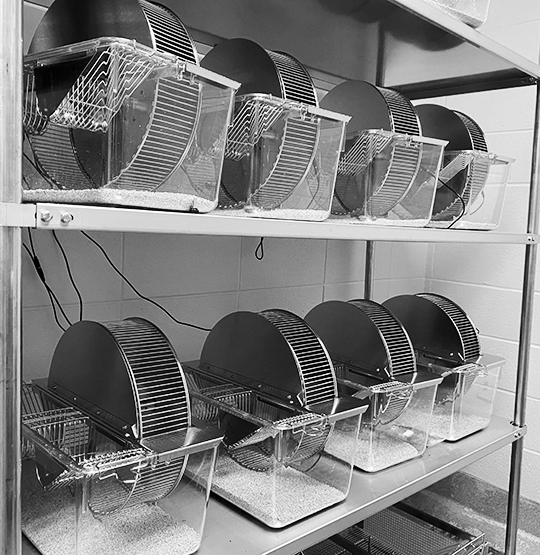
Starr Life Rat Wheels
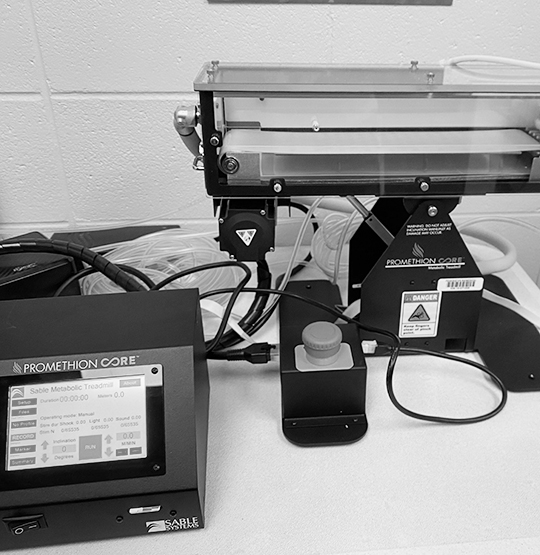
Sable Treadmill
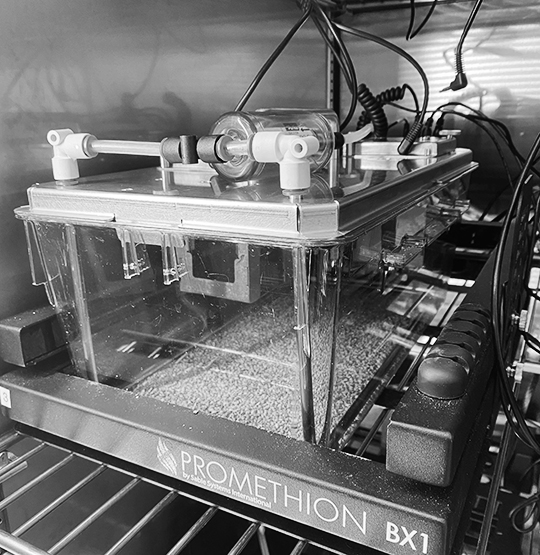
Sable Promethion
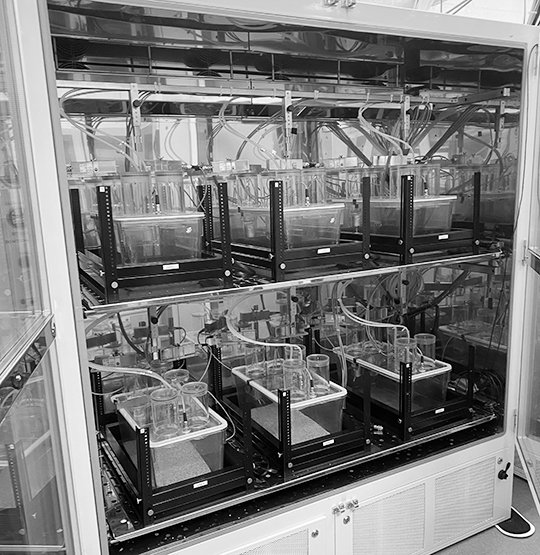
TSE Phenomaster
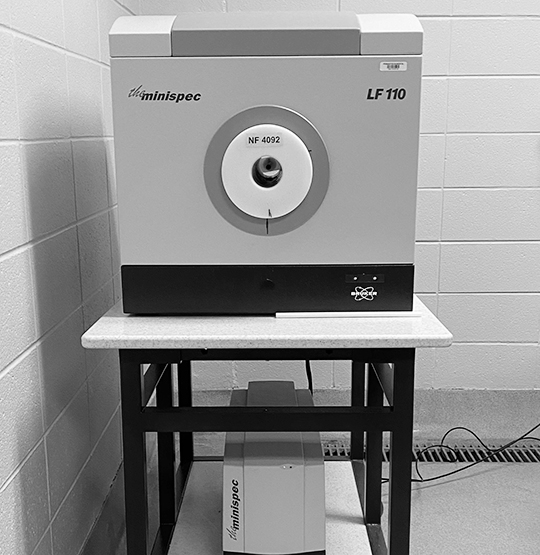
Bruker NMR
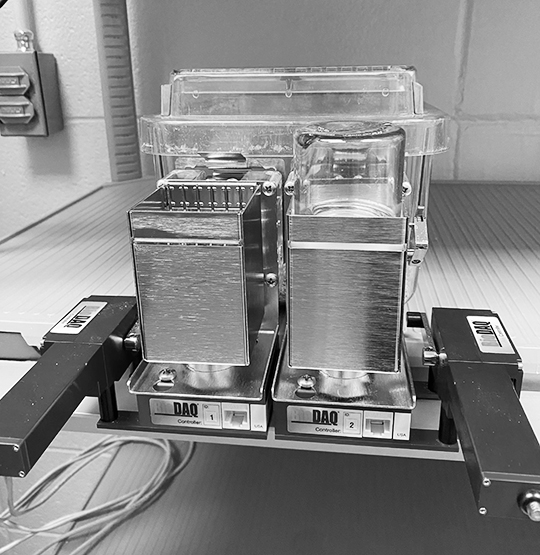
Research Diets BioDAQ


